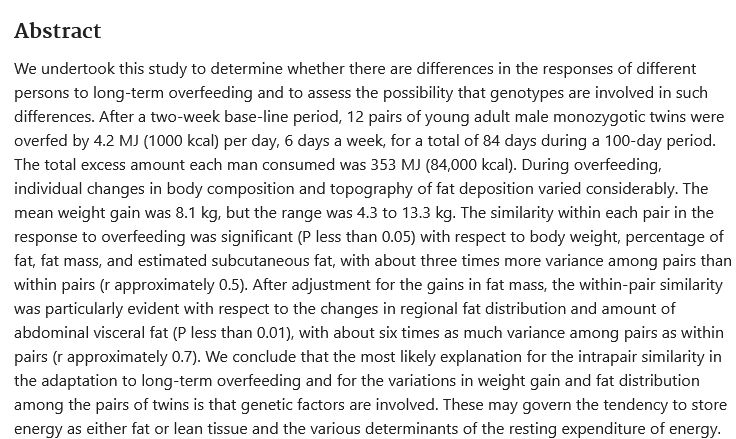I starting rereading Good Calories, Bad Calories, by Gary Taubes. It’s sobering.
- He discusses many populations that went from primarily meat to primarily (crappy) carbs and how much weight they gained.
- He reviews many studies showing that weight appears unrelated to exercise.
- He reviews studies showing increasing exercise does little to nothing. He likes one where they took sedentary men and women and trained them to run a marathon. The men lost an average of 5 pounds, the women lost nothing. (Had a colleague who trained for a marathon and ran it, lost no weight.)
- He reviews overeating studies where there’s a huge range in the amount people gain, even though they are eating the same “excess calories”.
Concerning #4, this has been one of the problems for me with CICO (calories in, calories out). I saw a person (on Threads? Don’t remember) who was calculating the difference between two foods and stating that one would cause 10 pounds of extra weight gain. I think it was full-fat yogurt versus non-fat yogurt or something similar (chicken with skin versus chicken without skin). I replied that there was zero percent chance that calculation was valid.
One of the reasons why (this study was cited by Taubes):
They took 12 sets of twins and made them eat 1000 calories more than what they calculated was their base calorie requirement. They did this 6 days a week for 100 days. Some people gained 9.5 pounds, but others gained 28.5 pounds. That’s a range of about 3 times. And if you use 3,500 calories = 1 pound the calculated amount would be 24 pounds (1000 cals x 84 days / 3500).
If you exercise, you don’t really burn many more calories,no matter how much you exercise (your body adjusts by lowering calorie output when you’re not exercising). If you eat less, your body most likely shuts down to require fewer calories. If you eat more, you may or may not gain much weight,and for the lucky few, the weight you gain might be muscle instead of fat.
Gary Taubes reaches the conclusion that weight gain/loss is primarily hormonal. I think he’s correct. If you go keto, you drop insulin,which means your fat cells can start giving up their energy to your body (instead of the energy being locked into the fat cells).
But even this doesn’t explain why some people can eat keto and get back to their lowest weights, while others don’t. I’m in the latter camp. Are we still “insulin resistant”? And if so, why?
And how do other hormones (eg, GLP-1) fit into this? Did we “break” something there, or perhaps we have unfortunate genetics that causes us to want to eat more (or perhaps burn less or store more or whatever)?
It’s sobering, because if you’re already keto, where do you go from here?

